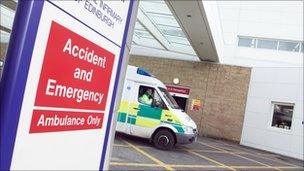Extra £1m pledged to boost A&E consultant numbers
- Published

The extra money comes as part of an emergency care action plan
An extra £1m is to be spent on hospital consultants for accident and emergency departments, the Scottish government has announced.
The move is aimed at tackling an increased number of admissions because of higher levels of flu, norovirus and respiratory illness.
Being seen by a senior consultant early is seen as key to reducing the length of time patients stay in hospital.
Ministers and doctors are working on an emergency care action plan.
The number of "whole-time equivalent" consultants, taking into account part-time workers, has increased from 76 in September 2006 to 144 in September 2012.
The additional money will provide extra investment on top of that.
Health Secretary Alex Neil said: "We are seeing more people than ever before coming to hospital as emergency admissions due to the increase in the ageing population.
"So its only right that we look at how we can do things better and improve how quickly people are seen in our hospitals and how quickly we can get them back on their feet at home.
"The vast majority of patients will continue to be seen in Scotland's A&E units within four hours but we encourage people to check if A&E is the best place for them to receive treatment.
"In many cases a minor injuries clinic or GP practice may be more appropriate."
The British Medical Association in Scotland gave the plan a cautious welcome.
A BMA spokesperson said: "Whilst we welcome this commitment for additional investment as a good start to addressing the pressures experienced in Scotland's emergency departments, there is a wider issue of the service reconfiguration which should form part of the debate on future workforce planning."
Jason Long, chair of the College of Emergency Medicine in Scotland, said: "We welcome the initiative and will work with Scottish government to direct this extra resource to the areas of greatest need."
- Published24 January 2013
- Published24 January 2013